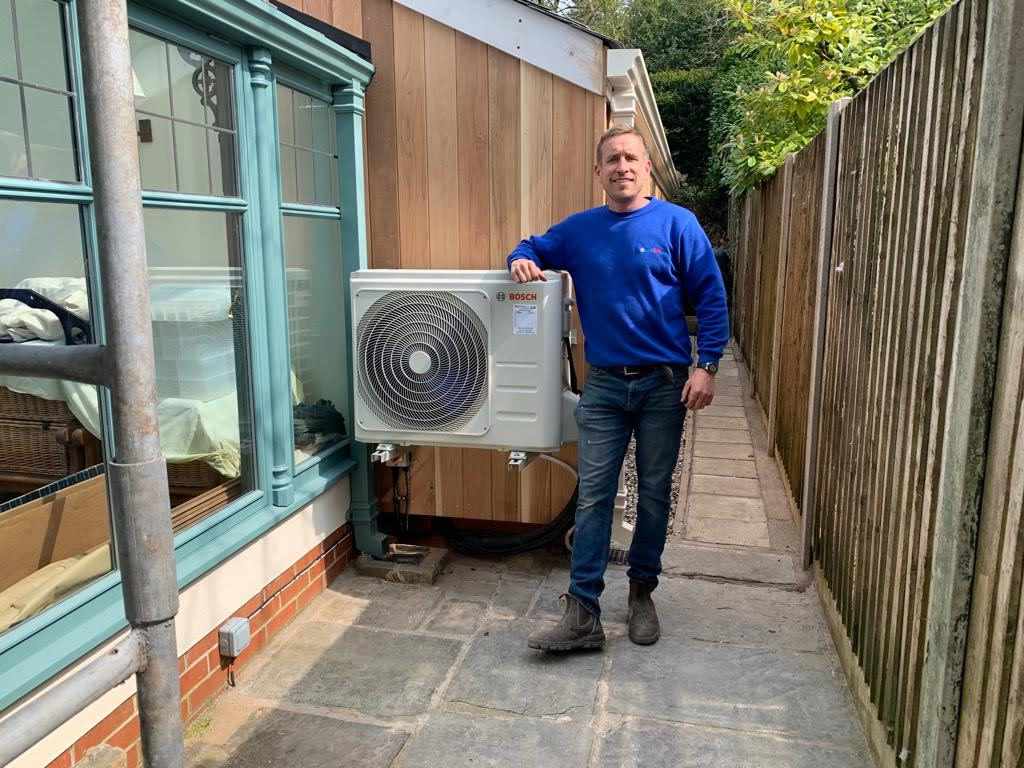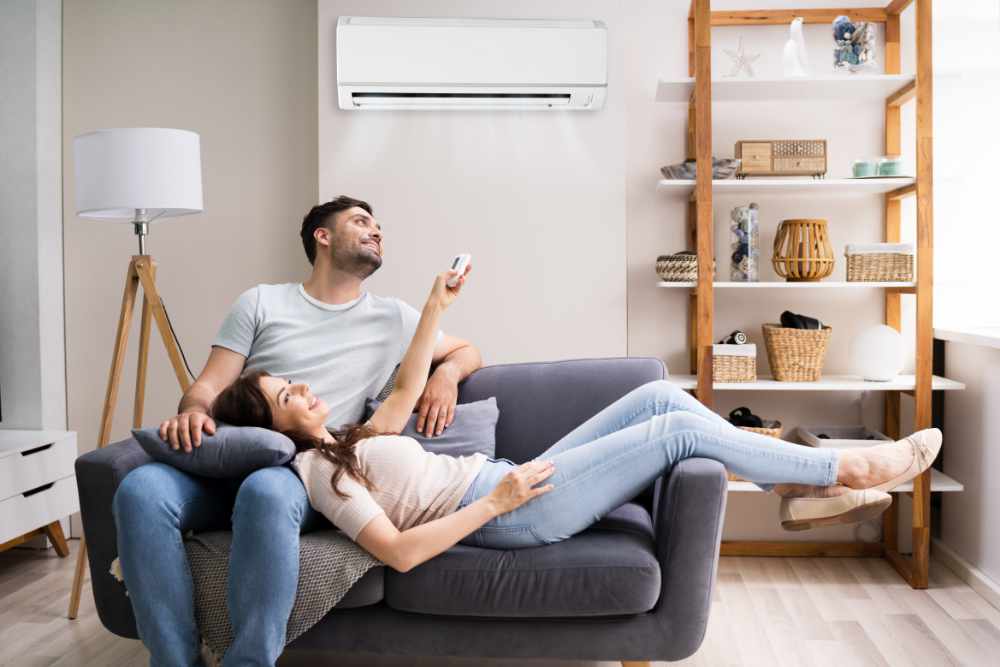Air Con for Homes & Home Offices
Too hot to sleep? Too hot to work at home?
We can install an air conditioner unit in your home or home office – quickly and without any fuss!

AddHeat will install the correct size of air conditioner for your space, but if you need some help with air conditioning just read our handy guide below.
How to Calculate What Size of Air Con You Need
If the size of your air conditioner isn’t right, it could mean it doesn’t cool your home or it could even create mould.

Dedicated, trusted tradesmen in the North West
Quality Workmanship
At Add Heat we pride ourselves on our high standard of work taking care of even the smallest detail to ensure you are 100% happy with the service carried out. Our reputation is what we have built our business upon and our attention to detail is what keeps our customers happy.
Expert Advice
With over 25 years experience in the cooling industry Add Heat are proud to be able to offer you expert advice and answer any of your air conditioning questions. We have time served experienced tradesmen to help you whenever you need us. With Add Heat you know you are in safe hands.
Energy Saving
We are home energy savings experts and can provide you with expert advice on how to create and maintain a more energy efficient home or business.
What are the types of air con systems?
Before you decide on the size of your air con, you should choose which air conditioning unit will best suit your home.
-
Window
A window or unitary air conditioner is a small unit that, as you guessed it, sits inside your windowsill. There is a vent to outside which gets rid of heat through condenser coils and sends cool air into your home.
They tend to be the least expensive type of air conditioner and their compact design can make them look better than other types. They can cool the whole house but are better for single floor properties.
-
Portable
This is plugged into your nearest socket and can be moved anywhere you want in your home. It will only cool the room you are in, but it is generally used on a temporary basis.
-
Central air handling unit
A central air conditioner is best for cooling large areas. This also makes it one of the largest air conditioners.
It is made up of two units, a condensing unit and an evaporative unit which are connected by tubing.
The condensing unit is placed outside, and the evaporative unit is placed inside. This type of air conditioning uses the same ductwork as your heating which is why they are also called ducted systems.
These units are generally the best for cooling an entire home.
-
Mid split
This type of air con has a few different names such as ductless air conditioner or inverter air con.
They use refrigeration pipework making them ductless. With no ducts, it looks better, and they can be lower in cost to run than a central air con.
It’s called a split system because it is in two parts. The condensing unit will be installed on your buildings outside, and the evaporative unit is placed on the inside.
Refrigerant tubing runs from the interior unit to the outside unit.
The inside unit can be wall mounted up high or low or it can be hidden in the ceiling or boxed with a grille to let out the cool air. It can also be placed in the attic to send cool air to all your rooms through the ducts.
Some split air conditioning systems may have more than one inside unit, but you should have control of each separately.
The importance of choosing the right size of air conditioner
It’s important to choose the right size of air conditioner for your home otherwise it will not work efficiently. It may mean it won’t cool your home properly, you may have to run it longer, or it’ll increase your energy bill.
A small air conditioner will probably not be able to cool a large room whereas a large air conditioner may cool the air quickly but doesn’t help with humidity. This is what can lead to moisture in the air which can cause mould and fungus.
Mould can also spread inside your air conditioner itself because of the moisture it’s taking out of the air. Usually, air conditioners will be placed at an angle to ensure the water is disposed of.
Mould inside your air conditioner can be circulated throughout your house and these spores can lead to allergies and lung issues.
This is why it is important to select the right size of air conditioner and to make sure it is installed properly by experienced and qualified air conditioning engineers.





Finding an air con engineer
Although most heating engineers will also be able to install air con. At Add Heat, we can give you advice on whether air con would be right for your home and also help you find the best air con system for your needs.
-

Experts in the heating industry
We have over 25 years’ experience in the heating industry and are Gas Safe Registered and OFTEC Registered.
-

Five-star rating
We have great reviews from our customers, with a five-star rating on Checkatrade.

Factors that affect the size of your home air conditioner
Factors that affect the size of your conditioner will include:
- The size of your room
- Where you live
- Your ceiling height
- The rooms exposure to the sun
- The number of appliances in the room
- How many people are in the room?
There may be other factors such as the number of windows or doors in the room and the type of insulation.
-
Size of your room
The bigger your room, the more powerful an air conditioner you need to feel any impact of the cool air.
-
Where you live
Some countries have higher temperatures than others or more humidity. If you live somewhere that has higher temperatures, then you will need a higher BTU/hour air con.
-
Ceiling height
You will need to measure the height of your ceiling and add 1000 BT/hour for every extra foot or 30 centimetres. The higher your ceiling, the more area your air conditioner has to circulate cool air.
-
Exposure to the sun
While the sun shining into your rooms throughout the day is generally a good thing, it’s not so much when you’re trying to keep cool. The sun heats up your room which means if it gets prolonged exposure to the sun, and it will take a larger air con to keep it cool. If you do have this issue, then you will need to increase the capacity of your air conditioner by 10%.
Of course, if you live in parts of the UK like Scotland or Northern Ireland where the sun only occasionally makes an appearance, then this won’t be as much of an issue, and you can choose a smaller air conditioner and can decrease the capacity by 10%.
-
The number of appliances in your room
Electrical appliances give off heat, so if there is a lot of electrical items in a room you should add an extra 400 BTU/hour.
-
How many people are in the room?
People radiate heat into the air which affects the temperature of the room. One or two people regularly in the room is fine and you won’t have to make any adjustments.
But for each additional person you should add 600 BTU/hour. But only if this is on a regularly basis.
Other factors that impact the cost of your air conditioning
When you have calculated the correct size of air conditioner for your room or home, you can purchase the correct size. The larger the air conditioner, the more expensive it will probably be.
You must also remember to check how much electric it uses, how much it will cost to install, and how much for a yearly service.
How much electricity your air conditioner uses will depend on how you are using it. Obviously the more you use it, the more electric it will use. A 6kW air conditioning system may use around 2kWh of electric which is around 30p per hour.
Most air conditioners will have a timer that you can set which means you’re only using it when you need it, and you won’t accidentally leave it on. Other models have zoning options meaning you can have the air conditioner on in certain rooms but not others.
You could also install a smart thermostat that will adjust the settings for you.
What size of air con do I need?
When it comes to choosing a size, it does not mean the actual size of the air conditioning unit, but instead how much heat it can remove in an hour. It is expressed in tons and BTU. BTU means British Thermal Units, meaning the heat.
To calculate the size of the air con for a room, multiply the length of your room by the width. Then multiply this by 25 BTU. You will also have to consider how many doors and windows there are as you may need a higher BTU per hour air conditioner if some of the cool air will be lost through doors and windows.
For example, if you have a room area of 100 to 150 square feet then the recommended size of air conditioner would be a 5,000 BTU/hour, for a room area of 150 to 250 square feet, a 6,000 BTU/hour air conditioner, for a 250 to 300 square foot room, a 7,000 BTU/hour, and so on.
This would mean for 1,000 square foot room you would need a 21,000 BTU/hour air conditioner and for a 2,000 square foot room, a 34,000 BTU/hour air conditioning unit.
You can use this air conditioner calculator to make things easier and quicker for you.
Air con installation
Your air conditioner installation won’t take long.
The first thing that needs to be done is to remove an old system, if you have one. If you need to dispose of an air conditioner you should check with your local council if they take these or check if your air conditioner engineer will take this away for you.
During a residential air conditioner installation, your engineer may need to add new piping or electrics. Your engineer will then install your new air conditioner.
Once this is done, your new thermostat will be installed. If you had an air conditioner previously, you may be able to keep the thermostat from that unit.
Once your air conditioning unit and thermostat are installed, your engineer will check everything is working and take you through how to use it.
Related Services
Check out our other services:
Tips on how to save on your air conditioner
We all want to save a bit of money on our energy bills, and your air conditioner will be no different.
-
Service your air conditioning
While servicing your air conditioning will cost you money, it will save you unexpected expenses in the future.
A service only needs to be done once a year and can save your air conditioning unit from unexpectedly breaking down (probably when you need it most) and leaving you with a repair bill.
Servicing also helps to keep your system in order, so that it lasts longer and provides you with better value for money.
You may also be required to service your air conditioner once a year as part of the terms of any warranty.
Any home insurance you have may not cover your air conditioner breaking down, so you may not be able to rely on this. Usually, your home insurance will only cover your air conditioner under certain circumstances. You should check with your home insurance provider.
-
DIY on your air conditioner
There are some things you can do yourself to keep your air conditioner running smoothly.
You should be able to clean or replace the filter yourself. Your filter will get clogged over time from dust and other particles. A dirty filter can mean your air conditioner has a harder job, but it could also circulate dust around your home. This simple DIY trick could save you up to 15% on your energy consumption.
You can also clean the coils yourself in the evaporator and outdoor condenser, although this only needs to be done around once a year and if you get it serviced, this will be included.
-
Adjust your thermostat
The easiest way to save on your energy bill is to turn your thermostat for your air conditioner up. Just like adjusting your thermostat for your heating, this can make a difference to your energy bill. A household can potentially save up to £128 a year when there is a one-degree difference.
An air conditioning system can create a comfortable environment in your home when it is the right size and installed properly.
For more information about air conditioning systems, contact us for advice on the best system for you.
Locations we cover
We cover a large area of approximately 20 miles radius of Macclesfield